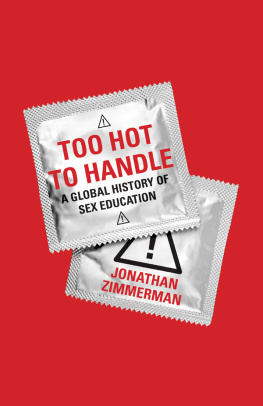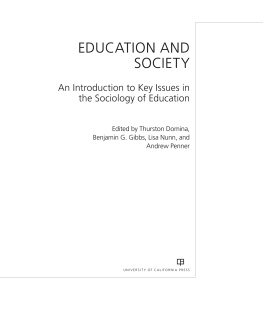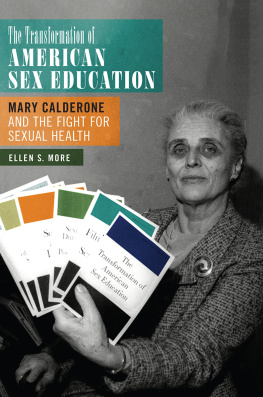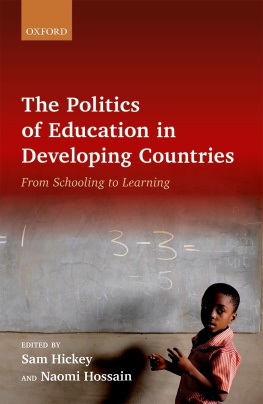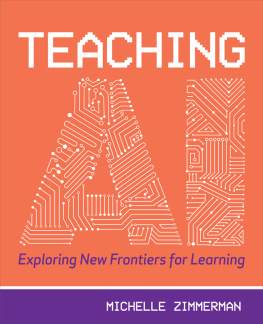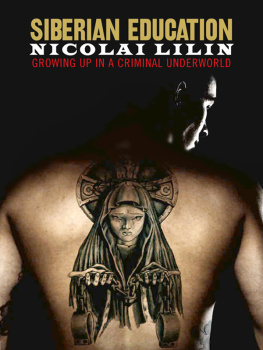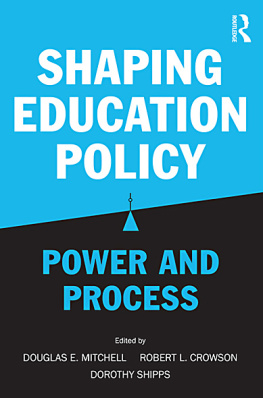
TOO HOT TO HANDLE
TOO HOT TO HANDLE
A GLOBAL HISTORY OF SEX EDUCATION
JONATHAN ZIMMERMAN
PRINCETON UNIVERSITY PRESS
PRINCETON AND OXFORD
Copyright 2015 by Princeton University Press
Requests for permission to reproduce material from this work should be sent to Permissions, Princeton University Press
Published by Princeton University Press, 41 William Street, Princeton, New Jersey 08540
In the United Kingdom: Princeton University Press, 6 Oxford Street, Woodstock, Oxfordshire OX20 1TW
press.princeton.edu
Jacket art Volodymyr Krasyuk/Shutterstock
All Rights Reserved
Library of Congress Cataloging-in-Publication Data
Zimmerman, Jonathan, 1961
Too hot to handle : a global history of sex education / Jonathan Zimmerman.
pages cm
Includes bibliographical references and index.
ISBN 978-0-691-14310-1 (hardback)
1. Sex instructionHistory. 2. Sex instruction for teenagersHistory. I. Title.
HQ57.3.Z56 2015
613.90712dc23 2014043559
British Library Cataloging-in-Publication Data is available
This book has been composed in Janson Text LT Std
Printed on acid-free paper.
Printed in the United States of America
1 3 5 7 9 10 8 6 4 2
FOR
MARGOT LURIE ZIMMERMAN,
FAMILY PLANNER EXTRAORDINAIRE
ACKNOWLEDGMENTS
I wrote this book while serving as chair of the Department of Humanities and Social Sciences in the Professions at New York Universitys Steinhardt School of Culture, Education, and Human Development. Theres simply no way I could have completed it without the help and support of my terrific colleagues and staff. Special thanks to Lucy Frazier, Jessica Cole, Letizia Larosa, and Erinn Bernstein, who kept the department running when I flew off to an archive or speaking engagement. Thanks, too, to the intrepid graduate students who have served as my teaching assistants during these years: Janet Bordelon, Christian Bracho, Ben Davidson, Cody Ewert, Noah Kippley-Ogman, Dominique Jean-Louis, Lauren Lefty, Maia Merin, Naomi Moland, Amy Scallon, Rachel Wahl, and Ashley White. Im also grateful to the leaders of the Steinhardt School, especially Dean Mary Brabeck. Mary made Steinhardt the best place to think, teach, and write about education in the United States. I wish her all the best in her post-dean endeavors.
Clara Platter first suggested this book to me, and Brigitta van Rheinberg brought it to Princeton University Press. I owe the title to my sister-in-law, Sharon Weinberg, who reads moreand more carefullythan anyone I know. Thanks, too, to friends and colleagues who read parts of the book or invited me to share them with audiences: Mary Ann Dzuback, Dagmar Herzog, Richard Hull, Peter Kallaway, Dan Segal, and David Spandorfer. Im grateful to the Arthur and Elizabeth Schlesinger Library for a grant to conduct research in its superb collections. Finally, medase (thanks) to my incomparably kind hosts at NYUs campus in Accra, Ghana, which has provided a home-away-from-home for several summers as well as a terrific place to try out the ideas in this book.
For the past eighteen years, I have been commuting between New York and my home in suburban Philadelphia. This placed extraordinary burdens on Susan Coffin in caring for our two beautiful daughters, Sarah and Rebecca. Theyre grown up now, and building their own lives, so were embarking on a new chapter. I feel incredibly fortunate that I get to write it with Susan, who remains the anchor of my world.
This book is dedicated to my mother, Margot Lurie Zimmerman, who spent her career in family planning and sex education. As I grew up, she imbued me with the standard liberal assumption that the United States was somehow behind more progressive countriesparticularly those in Western Europewhen it comes to sex education. But the United States actually pioneered the subject, as the ensuing pages will show. Then Europeans created a different type of sex education; one focused less on public consequences and dangers than on individual rights and pleasures. This challenges another liberal storyline from my youth, in which Americans emphasize individual freedoms while Europeans attend to the collective good. In sex education, it was precisely the opposite. Nobody was ahead or behind in this game; instead, different countries came to it with contrasting goals, expectations, and ideas.
I hope my mother wont mind that some of the ideas in this book depart from her own. The most important thing she taught me was that our beliefs about sex, love, and family matter. Obviously, thats one lesson Ive never forgotten. Enjoy the book, Mom. Its yours.
TOO HOT TO HANDLE
Introduction
THE CENTURY OF SCHOOL, AND THE CENTURY OF SEX
In 1900, the Swedish schoolteacher and author Ellen Key published a best-selling book with an auspicious title: The Century of the Child. Translated into several languages, Keys book, and its title, would become rallying cries for reform-minded critics, scholars, and educators around the world. Children were the hope of the future, Key wrote, but everywhere they were enchained by adults rigid rules and stern rebukes. Here she took special aim at the Wests signature child-rearing institution, the public school, which prescribed irrelevant doses of knowledge and pretended to measure the same with terrifying tests and examinations. But children learned best on their own and with their own parents, who had surrendered too much influence and authority to schools. Whereas gymnastics and art were formerly taught at home, for example, children increasingly learned them in the classroom. In the twentieth century, Key hoped, children would be emancipated from the sterile curricula and harsh pedagogy of the school. And parents would regain rightful control over the child, who could best develop individualityincluding conscience, judgment, and free willat home.
In many ways, however, the world was moving in the opposite direction. The ensuing century witnessed a dramatic explosion of state-run schools, which became ubiquitous across the West andeventuallyaround the globe. Between 1950 and 1970, the percentage of children who attended primary school rose from 58 to 83 percent; by 1985, 90 percent of the worlds children had spent at least some part of their lives at school. Secondary schools increased at an even faster rate, roughly tripling in number and size over the same span.would cultivate the freedom and agency of each individual, much as Ellen Key had wished. In practice, though, they frequently diverged from her ideal. In the developed world, child-centered classrooms were often distributed by social class: wealthier children received personalized attention and instruction, while poorer ones were more likely to experience the lockstep lessons and dry drills that Key detested. So did the vast majority of students in the so-called Third World, where skyrocketing class sizes and dwindling resources made individuated instruction impossible. How could a teacher with fifty or a hundred studentsand without much formal preparation herselfdo anything other than force-feed selected facts, which the children would dutifully regurgitate on their end-of-year exams? The twentieth century would not be the Century of the Child, at least not in the manner that Ellen Key had hoped. It was, instead, the Century of the School.
It was also the Century of Sex, which Key more presciently forecasted. People have commenced already to experiment with unions outside marriage, she wrote. The whole problem is being made the subject of debate. An avowed enemy of Christianity, particularly in its denigration of bodily pleasures, Key looked forward to the day when more and more individuals could determine their own sexual destinies. And so they did. Especially in the second half of the centuryand especially in the Westhuman beings would attain a level of sexual freedom beyond anything Ellen Key could envision. A new model of companionate marriage promised sexual pleasure for men and women alike, aided by birth control technologies that separated lovemaking from reproduction; homosexuals gained increased visibility and rights, includingmost recentlythe right to get married; and formerly tabooed sexual themes became common-place in literature and mass media, as censorship laws and regulations fell away. Many of these trends occurred earlierand more forcefullyin the developed than in the developing world, where older traditions and restrictions held sway. Nor was it clear that the liberalization of sexual mores was always liberating; for women, especially, the heightened public discourse around sex could feel more like a new set of expectations than a new license for freedom. Surely,
Next page
